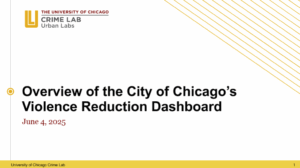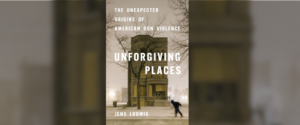Oct 2023
Predicting and Preventing Gun Violence: An Experimental Evaluation of READI Chicago – Final Paper
The findings from the READI study are the focus of this academic paper.
Gun violence is the most pressing public safety problem in American cities. We report results from a randomized controlled trial (N = 2, 456) of a community-researcher partnership called the Rapid Employment and Development Initiative (READI) Chicago. The program offered an 18-month job alongside cognitive behavioral therapy and other social support. Both algorithmic and human referral methods identified men with strikingly high scope for gun violence reduction: for every 100 people in the control group, there were 11 shooting and homicide victimizations during the 20-month outcome period. Fifty-five percent of the treatment group started programming, comparable to take-up rates in programs for people facing far lower mortality risk. After 20 months, there is no statistically significant change in an index combining three measures of serious violence, the study’s primary outcome. Yet there are signs that this program model has promise. One of the three measures, shooting and homicide arrests, declines 65 percent (p = 0.13 after multiple testing adjustment). Because shootings are so costly, READI generates estimated social savings between $182,000 and $916,000 per participant (p = 0.03), implying a benefit-cost ratio between 4:1 and 18:1. Moreover, participants referred by outreach workers—a pre-specified subgroup—show enormous declines in both arrests and victimizations for shootings and homicides (79 and 43 percent, respectively) that remain statistically significant even after multiple testing adjustments. These declines are concentrated among outreach referrals with higher predicted risk, suggesting that human and algorithmic targeting may work better together.

Webinar: Overview of the City of Chicago’s Violence Reduction Dashboard
The Crime Lab hosted a webinar that explored the City of Chicago’s Violence Reduction Dashboard—a publicly available tool launched to support efforts to reduce gun violence through transparent, real-time data.

Unforgiving Places: The Unexpected Origins of American Gun Violence
Crime Lab Pritzker Director Jens Ludwig authored a book that argues the lack of progress in reducing gun violence ultimately stems from our having misunderstood the nature of the problem, and that behavioral science gives us a new way to understand – and solve – gun violence in America.

2025 End-of-Year Analysis: Chicago Crime Trends
Violent crime declined substantially in 2025 across the country, including in our home city of Chicago – which experienced 168 fewer homicides through mid-December 2025 compared to the same period last year.

Local Gun Violence Dashboards
Chicago’s Violence Reduction Dashboard, launched by the Crime Lab in 2021, is featured in a toolkit created by Everytown for Gun Safety Support Fund as a part of its Gun Violence Data Fellowship.
Latest Updates
Former NYPD Chief of Department Kenneth E. Corey Named Executive Director of the Policing Leadership Academy
CHICAGO, IL — The University of Chicago Crime Lab today announced that Kenneth E. Corey has been appointed Executive Director of its Policing Leadership Academy (PLA), a first-of-its-kind executive education program designed to help police leaders reduce gun violence and build trust in the communities they serve.

Homicide rate declines sharply in dozens of US cities, a new report shows
The AP’s Claudia Lauer speaks with Crime Lab faculty director Jens Ludwig about the declining homicide rate in cities across the United States.

What it will take to fix American policing
Host Megan McArdle speaks with former New York City police commissioner William Bratton and former NYPD chief and new Policing Leadership Academy executive director Kenneth E. Corey about their work at the Academy and the program’s goals to reduce violence and improve fairness in policing.

